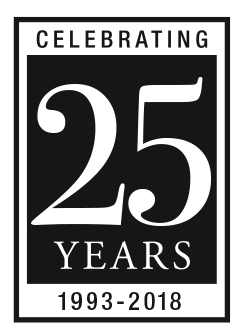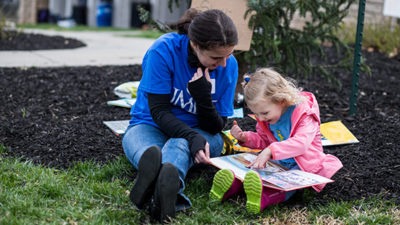 Inside any child care center, you might see small children sharing toys, toddling around their surroundings and making friends with other children. The staff of the UMKC Edgar L. and Rheta A. Berkley Child and Family Development Center see much more.
Inside any child care center, you might see small children sharing toys, toddling around their surroundings and making friends with other children. The staff of the UMKC Edgar L. and Rheta A. Berkley Child and Family Development Center see much more.
They understand these children are learning critical thinking skills and building the archetype of the brain. Play teaches children how objects work in the world; how people think, feel and act; and how to problem-solve. It is a crucial part of Berkley CFDC, which has served the UMKC campus and Great Kansas City Community for 25 years.
The Berkley Child and Family Development Center (CFDC) was established as part of the UMKC School of Education as a 12-month, full-day program serving as a learning laboratory for children from birth through age five. Berkley’s name is in honor of the major benefactor, Rheta Berkley and her husband, Edgar. Berkley was a leading figure and advocate of education and the arts in Kansas City for nearly three-quarters of a century.
Berkley CFDC is dedicated to reflecting state-of-the-art practices in early childhood education and working with children and families.
“Berkley was built on the vision to provide a progressive, creative approach to early childhood education, a devotion to developing the whole family in that education and a commitment to supporting its employees and the community,” says Polly Prendergast, Director of Berkley CFDC since 2003.
Berkley CFDC seeks to raise the quality of early learning in the Kansas City area. The cornerstone of their philosophy is building equal relationships among the family, child and teacher. Berkley CFDC is firmly embedded in constructivism: the theoretical view that learners construct knowledge through interactions with the physical and social environments. Berkley CFDC helps set the stage for these children with the understanding that 85% of intellect, personality and skills are cultivated by age five.
Berkley CFDC is inspired by the Schools of Reggio Emilia, Italy and actively studies their approach to education. It is also accredited by the National Association for the Education of Young Children. Nationally, only 7 percent of early childhood programs have received this accreditation.
Parents are drawn to the program because of Berkley CFDC’s method of incorporating research-based methods into its teaching practices. Both of Rheta Berkley’s great nieces, Sara and Sophie Sosland, enrolled their children at Berkley CFDC.
“The fact that Berkley has a clear vision for its approach to education and backs that up by continuing to explore new and better ways to refine and implement that vision is what makes it so great,” says Sara Sosland.
She also appreciates how inclusive the program is as well.
“I appreciate the value that Berkley places on professional development and continuing education for their own educators, and I think it’s wonderful that they provide those opportunities in-house,” Sara says. “They host opportunities for parents to learn more about infant and child development, and collaborate with other schools across the world.”
Berkley CFDC serves 100 students on a daily basis with 20 full-time and 18 part-time staff members. The programs have also grown over the years.
“Berkley expanded its infant-toddler program in 2000,” says Pendergast, “and since 2003 preschool enrollment has increased by 20%.”
To the parents, the extraordinary care that Berkley CFDC offers makes the center stand out when searching for the right place for their children.
“The staff at Berkley is wonderful,” Sophie Sosland says. “They’re warm, attentive, playful, and knowledgeable. We feel very comfortable knowing our son is under their care. And we are extremely pleased with the progress he has made in the last year.”
The School of Education also directly impacts the program through teacher preparation.
“Students from the School of Education’s early childhood program complete practicum teaching placements with us. Students complete observations and link those observations to their course work,” says Pendergast. “Practicum students, student teachers, interns, and other students from the School of Education are placed and or given assignments to complete here throughout the year.”
In addition, this year, Berkley CFDC initiated a community collaboration focused on professional development with St. Mark Center, an urban not-for-profit preschool located near 12th Street and Garfield Avenue.
Just like the children they care for, Berkley CFDC will never stop changing, which leaves only more room for growth. They continue to cultivate their programs based off current research and developmentally appropriate practice.
“Berkley challenges us to create a revolution in child care,” Prendergast said.

